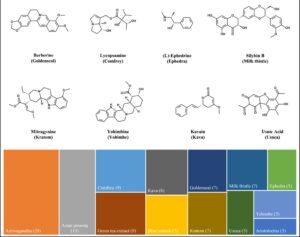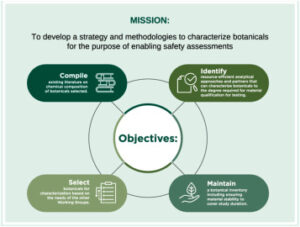A public-private partnership to improve botanical safety
BOTANICAL SAFETY CONSORTIUM
The Botanical Safety Consortium (BSC) was officially convened in November 2019, as the result of a Memorandum of Understanding between the US Food and Drug Administration (FDA), the National Institutes of Health’s National Institute of Environmental Health Sciences (NIEHS), and the non-profit Health and Environmental Sciences Institute (HESI).
Our current charge is to evaluate the suitability of assays for botanicals as complex mixtures.
The BOTANICAL SAFETY CONSORTIUM will provide a sound scientific basis for integrating existing botanical safety & toxicity information with the latest toxicological tools.
This multi-partite, multi-stakeholder international effort will bring together key scientific experts to enhance the botanical safety toolkit and bring clarity to botanical dietary ingredient assessments.
New publication: Prediction of physicochemical and pharmacokinetic properties of botanical constituents by computational models
A newly published study from the Botanical Safety Consortium used computational models to predict the physiochemical and pharmacokinetic properties of botanical constituents. This study investigated 103…
Read MoreNew publication: Within-laboratory reproducibility of Ames test results: Are repeat tests necessary?
A cross-sector group of experts from the Health and Environmental Sciences Institutes (HESI)’s Botanical Safety Consortium (BSC) and Genetic Toxicology Technical Committee (GTTC) analyzed data from the National Toxicology…
Read MoreNew publication: Advancing botanical safety
Advancing botanical safety: A strategy for selecting, sourcing, and characterizing botanicals for developing toxicological tools. Waidyanatha et al., February 2024. Food and Chemical Toxicology. https://doi.org/10.1016/j.fct.2024.114537 Increases…
Read MoreHESI is a non-profit, 501c3 charitable organization that convenes leading scientists from the public and private sector to identify emerging health challenges and solutions, translates science from research to application, and enhances the protection of human and the environment health worldwide.
For more information, please contact: botanicalsafety@hesiglobal.org.



